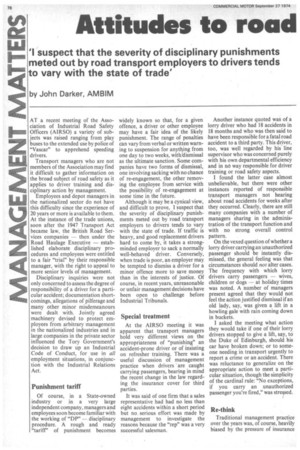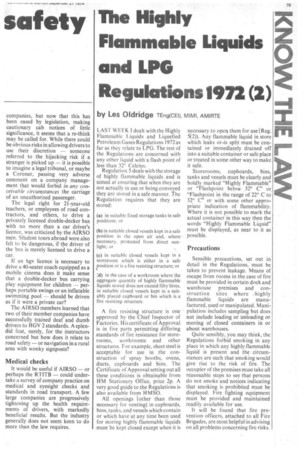Attitudes to road safety
Page 80

Page 81

If you've noticed an error in this article please click here to report it so we can fix it.
I suspect that the severity of disciplinary punishments meted out by road transport employers to drivers tends to vary with the state of trade'
by John Darker, AMBIM AT a recent meeting of the Association of Industrial Road Safety Officers (AIRSO) a variety of subjects was raised ranging from play buses to the extended use by police of "Vascar" to apprehend speeding drivers.
Transport managers who are not members of the Association may find it difficult to gather information on the broad subject of road safety as it applies to driver training and disciplinary action by management.
Employees and depot managers in the nationalized sector do not have this difficulty since the experience of 20 years or more is available to them. At the instance of the trade unions, soon after the 1947 Transport Act became law, the British Road Ser vices companies then under the z Road Haulage Executive — estab lished elaborate disciplinary pro lished elaborate disciplinary pro cedures and employees were entitled to a fair "trial" by their responsible manager, with the right to appeal to more senior levels of management.
Disciplinary inquiries were not only concerned to assess the degree of responsibility of a driver for a particular accident; documentation shortcomings, allegations of pilferage and many other minor misdemeanours were dealt with. Jointly agreed machinery devised to protect employees from arbitrary management in the nationalized industries and in large companies in the private sector influenced the Tory Government's decision to draw up an Industrial Code of Conduct, for use in all employment situations, in conjunction with the Industrial Relations Act.
Punishment tariff
Of course, in a State-owned industry or in a very large independent company, managers and employees soon become familiar with the working of "DP" — disciplinary procedure. A rough and ready "tariff" of punishment becomes widely known so that, for a given offence, a driver or other employee may have a fair idea of the likely punishment. The range of penalties can vary from verbal or written warning to suspension for anything from one day to two weeks, with 'dismissal as the ultimate sanction. Some companies have two forms of dismissal, one involving sacking with no chance of re-engagement, the other removing the employee from service with the possibility of re-engagement at some time in the future.
Although it may be a cynical view, and difficult to prove, I suspect that the severity of disciplinary punishments meted out by road transport employers to drivers tends to vary with the state of trade. If traffic is heavy, and good replacement drivers hard to come by, it takes a strongminded employer to sack a normally well-behaved driver. Conversely, when trade is poor, an employer may be tempted to dismiss a driver for a minor offence more to save money than in the interests of justice. Of course, in recent years, unreasonable or unfair management decisions have been open to challenge before Industrial Tribunals.
Special treatment
At the AIR SO meeting it was apparent that transport managers hold very different views on the appropriateness of "punishing" an accident-prone driver or of insisting on refresher training. There was a useful discussion of management practice when drivers are caught carrying passengers, bearing in mind the recent change in the law regarding the insurance cover for third parties.
It was said of one firm that a sales representative had had no less than eight accidents within a short period but no serious effort was made by management to investigate the reasons because the "rep" was a very successful salesman. Another instance quoted was of a lorry driver who had 18 accidents in 18 months and who was then said to -have been responsible for a fatal road accident to a third party. This driver, too, was well regarded by his line supervisor who was concerned purely with his own departmental efficiency and in nO way responsible for driver training or road safety aspects.
I found the latter case almost unbelievable, but there were other instances reported of responsible transport managers not hearing about road accidents for weeks after they occurred. Clearly, there are still many companies with a number of managers sharing in the administration of the transport function and with no strong overall control pattern.
On the vexed question of whether a lorry driver carrying an unauthorized passenger should be instantly dismissed, the general feeling was that circumstances should not alter cases. The frequency with which lorry drivers carry passengers — wives, children or dogs — at holiday times was noted. A number of managers present agreed that they would not feel the action justified dismissal if an old lady, say, was given a lift in a howling gale with rain coming down in buckets.
I asked the meeting what action they would take if one of their lorry drivers stopped to give a lift, say, to the Duke of Edinburgh, should his car have broken down; or to someone needing in transport urgently to report a crime or an accident. There was reluctance to generalize on the appropriate action to meet a particular situation, though the simplicity of the cardinal rule: "No exceptions, if you carry an unauthorized passenger you're fired," was stressed.
Re-think Traditional management practice over the years was, of course, heavily biased by the pressure of insurance companies, but now that this has been eased by legislation, making cautionary cab notices of little significance, it seems that a re-think may be called for. While there could be obvious risks in allowing drivers to use their discretion — someone referred to the hijacking risk if a Stranger is picked up — it is possible to imagine a legal tribunal, or maybe a Coroner, passing very adverse comment on a company management that would forbid in any conceivable circumstances the carriage of an unauthorized passenger.
The legal right for 21-year-old teachers, or employees of road contractors, and others, to drive a privately licensed double-decker bus with no more than a car driver's licence, was criticized by the AIRSO men. Sfudent tours abroad were also felt to be dangerous, if tlie driver of the bus is merely licensed to drive a car.
If an hgv licence is necessary to drive a 40-seater coach equipped as a mobile cinema does it make sense that a double-decker bus carrying play equipment for children — perhaps portable swings or an inflatable swimming pool should be driven as if it were a private car?
The AIRSO members learned that two of their member companies have successfully trained deaf and dumb drivers to HGV 2 standards. A splendid feat, surely, for the instructors concerned but how does it relate to road safety — or navigation in a rural area with wonky signposts?
Medical checks
It would be useful if AIRSO — or perhaps the RTITB — could undertake a survey of company practice on medical and eyesight checks and standards in road transport. A few large companies are progressively tightening up the health requirements of drivers, with markedly beneficial results. But the industry generally does not seem keen to do more than the law requires.




























































































































































